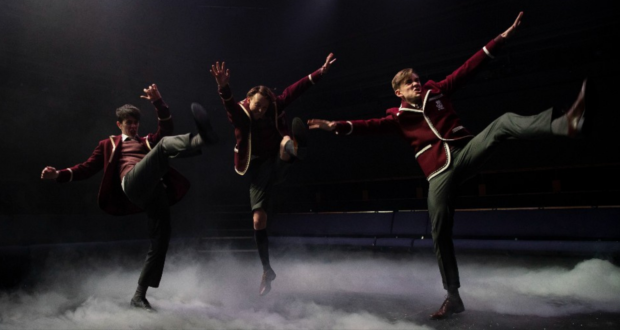A new play tells the painful true story of twenty-seven English schoolboys, whose teacher led them up a mountain on an ill-fated walking holiday. The carefully constructed atmosphere of psychological intensity is sadly wasted on an extended Brexit analogy. Summary
Rating
ok
It’s a spring morning in 1936, and it’s just started raining in the German town of Freiburg. Twenty-seven English schoolboys are waiting for their teacher outside a hostel. They stand hands-on-hips, taking exaggerated deep breaths to show off how much they are enjoying the fresh mountain air. Soon, five will be dead, in what came to be called “The Black Forest Tragedy.”
Pamela Carter’s play tells this tragic true story through the eyes of three boys. All three actors are brilliant: bright, excitable, and full of jumbled ideas about courage, boyhood and Britishness. All constantly breaking the fourth wall to define Latin terms and to make bleakly prophetic remarks about what happens next.
We watch events unfolding: the irresponsible teacher failing to heed the warnings of locals, the boys hungry to prove themselves, competitively declaring themselves unbothered by the snow and keen to reach the summit. “Could we have turned back?” asks Harrison, played convincingly by Hubert Burten, with a growing sense of desperation. “Are we going to go the route that the Nazi hostel manager recommended? Or are we going to go our way?” Could they face walking back, past the sneering German boys they passed that morning?
Despite the heavy-handed Brexit allusions, we really feel why pushing on to the summit seemed inevitable. And we too are up the mountain with simple yet effective special effects. Flurries of snow, sudden darkness, the confusion of the all-consuming fog, I even found myself shivering.
Matthew Tennyson as Lyons is the highlight. He is fidgety and determined, shivering in his shorts, pelted with snowballs by the other boys. Someone asks him, sneering, emboldened by being in Germany, “Are you a Jew?” and he replies, nervously, “I’m English.” Vinnie Heaven as Eaton exudes scruffy confidence and transforms as the cold brings on erratic behaviour including delusions and paranoia.
Despite the compelling subject matter, capable cast, and occasional flashes of insight, there are major weaknesses in the script. Musical interludes with tourist information about Freiburg feel redundant, while Éva Magyar’s Tour Guide feels badly out of place and could be cut entirely. Dissipating the carefully constructed atmosphere of psychological intensity, and seizing the narrative from the boys in their final moments to make Brexit analogies, feels cruel.
The political commentary is too obvious throughout. The Brexit references of varying subtlety are ceaseless, and at one point one of the boys apologises for the lack of women in the story. The central message is clear: masculinity and imperialism sent these boys up the mountain, and masculinity and imperialism killed them. But to satirise 1930s masculinity is to take on a weakened enemy. After all, who now defends the political, moral, or cultural norms of the 1930s? Did we really exit the European Union driven by the same emotions that built the Empire? The people who held those values aren’t in power now: they are dead. Many of them died fighting the Nazis.. I couldn’t escape the sense that we were supposed to conclude that whatever virtues or faults allow a person to do that – such as the foolhardy courage and enthusiasm for self-sacrifice displayed by the boys – are now childish, old-fashioned, and suspect, even if we do find them partly endearing.
Come the end, I felt unsatisfied. Partly because the very abrupt conclusion left a sense of more to be said, while the Tour Guide had worn me down and the energy never quite recovered. But also because the arguments in the narrative, delivered so confidently and prescriptively, had not captured me. Nevertheless, this was a well-executed production with a handful of powerful moments, and it still gave me lots to consider.
Written by: Pamela Carter
Director: Oscar Toeman
Designer: Jasmine Swan
Lighting Designer: Elliot Griggs
Sound Designer: Daniel Balfour
Movement Director: Rachel-Leah Hosker
Musical Director: Naomi Hammerton
The Misfortune of the English plays at Orange Tree Theatre until 28 May. Further information and bookings can be found here.
 Everything Theatre Reviews, interviews and news for theatre lovers, London and beyond
Everything Theatre Reviews, interviews and news for theatre lovers, London and beyond



